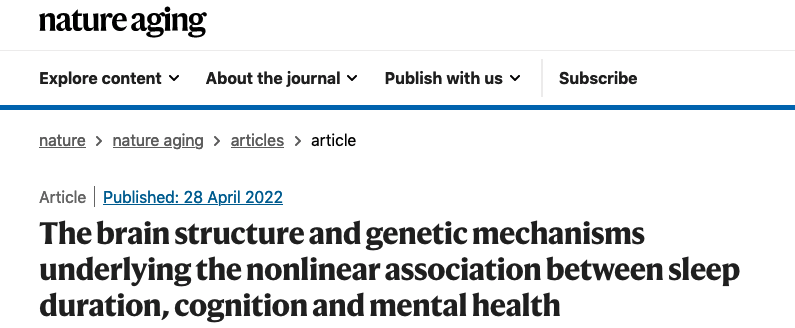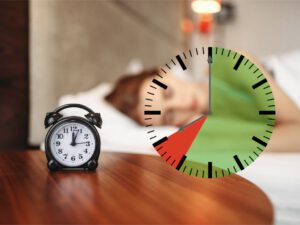The aim of this study was to find out the optimal duration of sleep. What is actually too much or too little sleep? Basically applies to both:
Anything that harms the natural regeneration process is too much or too little sleep!
Michael Wieden
Too little sleep is easy to define. Usually it is a limiter (e.g. working hours/alarm clock) that ensures that sleep cannot finish its work. It’s like in the garage. If the mechanic stops after 2/3 of the work, the car isn’t repaired yet.
“Too much sleep” is much more difficult to identify, since it is usually difficult to determine whether possible negative effects result from “too much sleep” or from the actual cause of sleeping too much.
Basically, we only want to report here on a new study from China. In his blog, however, Michael Wieden took a closer look at this study and drew a rather negative conclusion. Go to this article here.
Original title of the study
The brain structure and genetic mechanisms underlying the nonlinear association between sleep duration, cognition and mental health
Published: 28.04.2022

Our speed summary for optimal sleep duration
Scientists from the Institute of Science and Technology for Brain-Inspired Intelligence, Fudan University, Shanghai, China, examined data from almost 500,000 adults between the ages of 38 and 73 collected in the British database “UK Biobank” in a study. As a result, an optimal sleep duration of 7 hours is recommended in this study.
Abstract
Quote translated from English:
“Sleep duration, mental disorders and dementia are closely linked in older adults. However, the underlying genetic mechanisms and structural changes in the brain are unknown. Using UK Biobank data for participants of predominantly European descent aged 38-73 years, including 94% White, we identified a non-linear association between sleep, with around 7 hours as the optimal sleep duration, and genetic and cognitive factors, brain structure, and mental health as key interventions. The brain regions most clearly underlying this connection included the precentral cortex, the lateral orbitofrontal cortex, and the hippocampus. Longitudinal analyzes revealed that both insufficient and excessive sleep duration were significantly associated with declines in cognition at follow-up. In addition, mediation analysis and structural equation modeling identified a unified model spanning polygenic risk assessment (PRS), sleep, brain structure, cognition, and mental health. This suggests that possible genetic mechanisms and structural changes in the brain may underlie the nonlinear relationship between sleep duration and cognition and mental health.”
Interesting articles on this study

Source
Michael Wieden beschäftigt sich als Betriebswirt seit 2002 mit der Chronobiologie im Personalmanagement. Schon 2003 hielt er hierzu seinen ersten Vortrag auf einer Veranstaltung der INQA (Initiative der neuen Arbeit).
Zu den Themen „Chronobiologie im Personalmanagenement“ sowie mobilen Arbeitsformen hat er bereits Bücher geschrieben, und dabei den Begriff „Liquid Work®“ geprägt.
Zusammen mit Claudia Garrido Luque gründete er 2014 die aliamos GmbH und berät seit dem Kommunen, Unternehmen und Kliniken zum Betrieblichen Gesundheitsmanagement. Von 2012 bis Ende 2016 war er externer Wirtschaftsförderer für die Stadt Bad Kissingen und Initiator des weltweit einzigartigen Projektes „ChronoCity – Pilotstadt Chronobiologie“. Zu ChronoCity®, Chronobiologie-Themen und mobilen Arbeitsformen trat er wiederholt als Experte in verschiedenen Fernsehformaten (z.B. TerraX, Planet Wissen, W wie Wissen, Xenius etc.) auf. Zudem war er von 2014 bis 2017 Mitglied des Arbeitskreises „Zeitgerechte Stadt“ der ARL – Akademie für Raumforschung und Landesplanung in Hannover.
Aktuell hält er Vorträge zum Thema “Chronobiologie im Personalmanagement” und “Mobile Arbeitsformen”, und berät Unternehmen bei der Umsetzung chronobiologischer Ansätze in Unternehmen und Kliniken.
